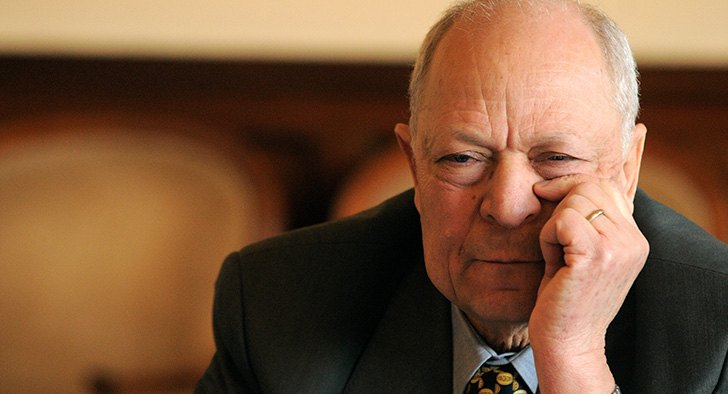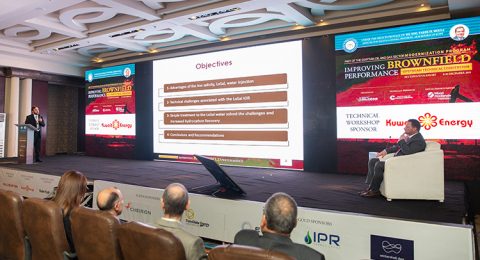By Gamal Shaban, Salma Sherif, Nataša Kubíková
Dr. Hamdi El Banbi, a petroleum engineer, who led Egypt’s Oil Ministry between 1991 and 1999, suddenly passed away at the age of 81 on August 11th 2016.
Dr. Hamdi El Banbi has left behind a massive legacy that will continuously impact the Egyptian oil and gas industry. His inputs will serve as guiding principles for future visions and missions of the country’s different energy sectors, promising to boost its potential and capacity. His achievements range across various segments of the industry.
As the country’s oil minister, Dr. El Banbi had a different vision and made it come true. In the 1990s, he launched, what became known as a new era of the industry in Egypt. His trust in the capacities and potential of the Egyptian sectors focused on decreasing dependency on foreign production and supply. He was interested in developing the sectors’ long-term business strategy that would rely on domestic resources. In doing so, Dr. El Banbi encouraged the establishment of new Egyptian investment and service companies within the oil sector that lowered Egypt’s reliance on foreign inputs.
In line with that, especially in the year 1997, many Egyptian oil and gas exploration and production companies (E&P) were founded under El Banbi’s leadership. Their role was to inject more investments and thus facilitate further domestic development in the sectors.
As Eng. ShaheenShaheen, IPR Egypt Vice President told Egypt Oil&Gas, “during his reign, the number of upstream companies jumped from a handful few to more than thirty companies.” Unlike in previous practices, when “all the engineering designs and constructions were done by Italian and American companies,” he added, Dr. El Banbi opted for a different strategy and “established Enppi and Petrojet at a time when no one thought we could do without foreign help.”
In addition, El Banbi has also taken the maintenance companies into consideration and founded the Egyptian Maintenance Company, and Alexandria Petroleum Maintenance Company (PETROMAINT). Furthermore, he recognized the need of adequate fund raising programs to develop other various petroleum service, production, and maintenance companies such as Alexandria Mineral Oils Co. (AMOC), SidiKerir Petrochemicals Co. (Sidpec), and Alexandria National Refining & Petrochemicals Co. (ANRPC).
Another significant achievement of Dr. El Banbi’s leadership at the Oil Ministry was the establishment of the biggest crude oil refining company in the region. Under his supervision, the Middle East Oil Refinery (MIDOR), the Egyptian shareholding company, was founded in July 1994. It necessitated an investment cost of $1.1 billion and the aim of this project was to refine crude oil in Egypt and produce high-quality petroleum products that would be suitable not only for domestic market, but also to be exported globally.
On this account, Former Vice Chairman of the Petroleum Authority, Eng. Medhat Youssef, noted that “in 1994 Dr. El Banbi also attempted to establish another multimillion dollar company – similar to the MIDOR project – that would take place in the Suez Governorate, but unfortunately the international banks refused financing his project that needed a minimum investment amount of $600 million.”
Nonetheless, Dr. El Banbi strongly promoted local production and manufacturing. “Building drilling platforms and surface units of artificial lift pumps saved Egypt billions of dollars,” noted Eng. Shaheen. GUPCO’s Media General Manager, Ashraf Zein Al Abedeen, remembered El Banbi’s role as CEO of Gulf of Suez Petroleum Company (GUPCO). He noted that El Banbi’s work resulted in the construction of many offshore platforms, in addition to many inshore facilities, at the company’s concessions in the Gulf of Suez and in the Western Desert, and in the expansion of RasShokeir field.
This active, locally reliant approach of Dr. El Banbi, won him many supporters. Mahmoud Shawkat, Director Sales & Marketing – Egypt, Libya & South Sudan at Baker Hughes wrote to Egypt Oil&Gas in an email statement that in 2000, Dr. El Banbi was actively raising awareness among the Egyptian industry players to that end. “At an oil & gas event, Dr. El Banbi stopped by Petrojet booth and opened a long discussion about if we design and manufacture locally. After that, he handed me over his business card, asking to meet with Petrojet management to collaborate and finalize an agreement for Made in Egypt Products scheme. This was a surprising moment for me,” remembered Mahmoud Shawkat.
In light of this strategy, Dr. El Banbi already in 1970s, then as CEO of GUPCO, ensured that the company itself “granted up to more than 600 BOPD to the country’s national grid, which was 60% of the country production by then,” said Mahmoud Shawkat, who worked at GUPCO at the end of 1980s. Under El Banbi’s chairmanship, GUPCO experienced “a phase of production increase as well as a phase of improvement for the main fields such as Morgan, July, and Ramadan fields,” GUPCO’s Media General Manager, Ashraf Zein Al Abedeen told Egypt Oil&Gas.
International Cooperation
Dr. El Banbi in his ministerial time also recognized the role that foreign oil investors could play in the Egyptian energy industry, yet merely within the strategic framework of locally-focused development.
Firstly, Dr. El Banbi introduced a novel price equation for oil and gas. As he linked oil price value with Brent Crude Prices, he has succeeded in gaining attention of international oil companies (IOCs) to invest in developing the fields and undiscovered reserves in the country.
This approach resulted in new discoveries that have rendered oil a vital element of the Egyptian economy in the late 1990s, despite the fact that Egypt had never been among the most dominant players in the international oil scene. Egypt’s oil exports were the major source of scarce foreign currency during that period, as oil accounted for an average of 40% of Egypt’s export earnings and 10% of the Gross Domestic Product (GDP).
During Dr. El Banbi’s era, Egypt thus witnessed numerous, new oil and gas finds that enhanced the country’s oil production rates. The opening of the first Egyptian private sector oil field, Burj Al Arab, that is located in the Western Sahara region, in July 1997, and the BeniSuef Petroleum field, launched in October 1997, both came as invaluable evidence of his accomplishments.
At the same time, in the period when Dr. El Banbi was the minister, “Egypt adopted new strategies in oil and gas industry such as exploring excavating in the Mediterranean deep waters that led to the currently discovered concessions in the Mediterranean Sea,” affirmed AshrafZein Al Abedeen. Further, the signing of the binding agreement between the Egyptian General Petroleum Corporation (EGPC) and Italy’s Eni to construct and develop a pipeline to transport natural gas from the offshore fields in the Mediterranean Sea to the North of Sinai through an underground tunnel located underneath the Suez Canal materialized. The project began in August 1998. On top of that, Dr. El Banbi took a courageous move and promoted exploration for hydrocarbon reserves in remote sites.
Dr. Hamdi El Banbi clearly believed that a minister’s main objective is to efficiently and effectively increase both the production and the resources within the country. There is no doubt that Dr. El Banbi has succeeded in reaching this objective, even though his leadership came in a very challenging period that sent shocks all over the international oil market, even to the most oil-rich countries, due to the arising of the 1991 conflict in Iraq. Dr. El Banbi has clearly converted these challenges into opportunities during this unstable time period.
Natural Gas Network
As for the natural gas sector of the Egyptian industry, Dr. Hamdi El Banbi was the first Egyptian official to address the country’s urgent need for expanding the natural gas network throughout the governorates. His gas-to-home delivery scheme marked a significant shift in gas supplies all over the country. He applied this system in operating air conditioning in Egyptian homes, which rendered the country a pioneer in this area across the Middle Eastern region.
Furthermore, he realized the importance of diversifying the country’s fuel supply system, which appears to have been enrooted by now as an inevitable element in the Oil Ministry’s strategic planning. In his view, natural gas was also to be included as an alternative fuel for vehicles.
Most recently, in February 2016, Dr. El Banbi presented his contribution to the natural gas sector at the executive roundtable – The Future of Natural Gas Industry in Egypt, as EGA’s Honorary Chairman. In his remarkable presentation, El Banbi shared his insight in the challenges that the energy sector is facing. He said that while “we try to minimize the costs, we try to increase production, we try to do liberalization from one part or another, we should not wait until everything is established; instead all areas should be worked on simultaneously.” He reiterated that “one of the most important things to do at the present time is to concentrate on increasing production at minimal costs.” He thus again showed that he has been a vocal advocate of locally branded developments in the natural gas sector.
As Eng. ShaheenShaheen, IPR Egypt Vice President, remembered in an email statement to Egypt Oil&Gas, he met Dr. El Banbi in June 2016, and on this occasion he held a prolonged discussion with him about his forecast for the future of natural gas in Egypt. “Dr. El Banbi told me that the current shortage of natural gas in the country is temporary and he predicted that Egypt will start exporting the gas already in the next few years,” explained Eng. Shaheen. It is still to be seen if the Egyptian gas sector succeeds in this regard and fulfills this aspiration and vision of Dr. El Banbi.
Environmental Concerns
Dr. El Banbi was also a pioneer when it came to meeting the ministry’s environmental responsibilities. He was aware of the environmental consequences that the nature of the oil and gas industry is prone to cause and how the exploration and exploitation operations within the industry are infamous for heavily contaminating the environment and causing diseases to the indigenous societies.
In one incident, after conducting various types of research on Egypt’s increasing levels of pollution, the Oil Ministry realized that lead-based substances used in refining the petroleum products are carcinogenic substances and can increase the number of lung cancer patients in Egypt. Based on Dr. El Banbi’s request, Egypt’s oil and gas experts and scientists have teamed up to come up with an alternate substance to replace the lead used in refining. After many phases of experimentation, it was proven that the new discovered substance is more friendly to the environmental and is not hazardous to the individuals’ health. The experiment was then transferred to the refining locations in Cairo, Alexandria, and Suez.
Doing Good as Oil Minister
In his interview with El Masry El Yom in 2011, Dr. El Banbi shared his experience when he worked as a minister in a positive tone. He believed he was lucky and ready for the challenge it entailed. El Banbi said: “I was dealing with all the minds of administrators and scientists, but the difference between being a minister and being a chairman of a company is that, in the latter, you work in a specific framework, but being a minister necessitates political leadership and has its own requirements. It has its work style, in addition to the accountability to the parliament. These factors affect performance since that the minister’s main concern is to increase production and resources.”
In light of this awareness, Dr. El Banbi added: “During my position as a minister I think I managed to do good for the country. I supervised the completion of many agreements, and addressed the issue of natural gas to be used instead of fuel.”
On the other hand, El-Banbi criticized the policy, through which people in ministerial positions are rewarded and withdrawn. He said, in the same interview, that “the worst thing at the ministry is that someone gets hired, then he is dismissed from his job replaced by another person without any logical reasons.”
Legacy of Dr. El Banbi
Dr. El Banbi’s legacy for Egypt’s energy industry will continuously shape the steps that the ministry and the government will adopt in the future. Throughout the decades of his public service, he has become an inspirational model for generations to come. His ability to take strategic decisions in critical times made Dr. El Banbi “a scientist in the garb of a knight” as many officials in Egypt’s oil and gas industry acknowledged, including Eng. Khaled Abu Bakr, the EGA’s Executive Board Chairman in an interview with El Masry El Yom in August 2016.
Dr. El Banbi has been recognized as a true visionary. “In 2008, in a TV interview, Dr. El Banbi mentioned that oil is no longer a weapon to be used against others and we, as a nation, have to look for a different strategy with the West,” remembered Mahmoud Shawkat, adding that “this statement has come true as we can see nowadays.”
It is thus no exaggeration to note that as a petroleum engineer, Dr. El Banbi presented himself as an exceptional visionary strategist. According to Eng. Khaled Abu Bakr, Chairman of the Egyptian Gas Association (EGA) cited by El Masry El Yom, “Dr. El Banbi was a wise and prudent person in problem solving. He was an unconventional minister who made efforts to establish investment companies for the industry.” A range of his achievements thus undoubtedly led many, including Former Vice President of EGPC, Medhat Youssef, to recognize Dr. El Banbi as “the founder of the petroleum and gas industry in Egypt,” as El Masry El Yom quoted him saying in August 2016.
“In brief, Dr. El Banbi was a great leader in our industry who has left a strong imprint that will never be forgotten. If someone decides to issue an energy book, Dr. El Banbi’s history will take a big part of it,” concluded Baker Hughes’ Director. “He was not just a minister, he was a legend. He was a mentor to our entire generation as people would seek his advice for career-related decisions, his wisdom. His scope of vision always proved to be the best,” said Eng. ShaheenShaheen.
Hamdi El Banbi was an exceptional engineer, doctor, manager, minister, businessman, and politician. He was a living proof that simplicity, hard work, discipline, and ambition are what shape a petroleum engineer into a legend. The projects, achievements, and milestones that Egypt has reached during his leadership have highly contributed to the whole Egyptian economy and shaped Egypt’s current energy sector. He will remain as an inspiration to many current and upcoming officials in Egypt’s industries.
Farewell Doctor Hamdi El Banbi, the father of the Egyptian oil and gas industry.
Dr. Hamdi Ali Abdul Wahab El Banbi was born in Assiut on August 7th, 1935. He was the fifth-oldest son in a family of 12 siblings and always dreamt of becoming a Petroleum Engineer. He earned his Bachelor degree in Petroleum Engineering from Cairo University in 1959 and then conducted his post graduate studies in Economics of Petroleum Engineering at the University of Moscow after receiving a scholarship from the then-President Gamal Abdel Nasser in 1960. He earned his Doctorate degree in the same field from Texas A&M University in 1963. In the same year, he joined the Eastern Petroleum Company as a Production Engineer. He worked there until 1966 when he decided to become a lecturer at the Faculty of Engineering at Al-Azhar University. Two years later, in 1968, Dr. El Banbi started his nine-year career at the Western Desert Petroleum Company (WEPCO), where he kept moving up the ladder until he became the highest authority at the company’s General Directorate of Operations. Later on, in 1977 Dr. El Banbi was granted the chairmanship of the Gulf of Suez Petroleum Company (GUPCO) and stayed in this position for 11 years. In 1988, after gaining an extensive experience in the Egyptian energy sector, he started serving as the Chairman of the Egyptian General Petroleum Corporation (EGPC) until 1991. In that year, his acquired knowledge and experience served him well to get him nominated by the Egyptian cabinet, headed by Prime Minister AtefSedki, to replace Abdel HadiQandil and become Egypt’s 17th Minister of Petroleum. Dr. El Banbi led the Ministry of Petroleum until October 1999.








